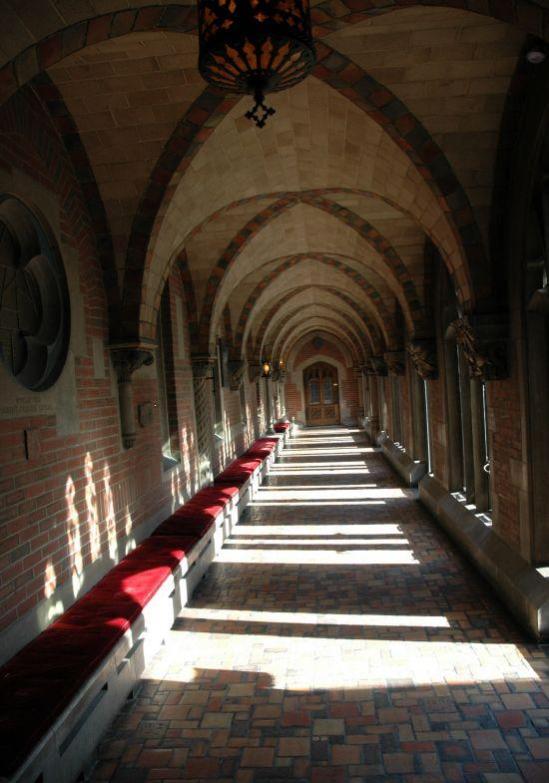
Cloister at Chicago Theological Seminary (2007)
As I go into a kind of seclusion for the next couple of weeks to take my doctoral exams, I wanted to reflect for a moment on what I’m doing, what I feel about it, and why.
I’ve been in seminary for almost 10 years. I’m not bragging. If you’ve been to where I am, you know how little there is to brag about. It is tremendous work, with little glory paid out. I’m not even finished, yet. Even when I do, there are only teacher’s salaries, few positions, and no real status positions. But, at a deeper level – spiritual and almost beyond measure – there is so much I’ve gained.
Over ten years ago, entering Saint Paul School of Theology, I was on a journey. I felt my way into seminary led by something I didn’t fully understand. I was curious about God and life. I was haunted by an insatiable sense of “Why?!” I was spiritually hungry.
Church offered me so much in terms of love and spiritual challenges. But, now, it offered little to answer my questions and offered no real a path to some kind of spiritual or personal development. I guess I unconsciously believed in the goodness of education and its betterment. I hoped to “arrive” somewhere on the other end of seminary. But, I only knew a few examples of persons who had been through theological education. I didn’t want to be just like them; in fact, I wanted (and still do!) to overcome what I thought were some of their blind-spots and mistakes. I also wanted to understand the things they seemed to know about. I wanted to be able to say some of the things I was hearing them say.
After 10 years in two different seminaries, I’m at the point of my doctoral exams at Chicago Theological Seminary. I’m not sure I’m where I imagined I’d be. But, I am finally beginning to see where I’ve come. I’m beginning to feel and appreciate – in a way I can barely explain – what doctoral work and its pressure for disciplined study has done for me. I’m beginning to see that I’m coming into “that place” I was unwittingly searching for, and could have never imagined. There is something immeasurable I’ve gained.
I’ve not so much received an education, but gained a way of life in spiritual discipline.
Reading, writing, and love of God have come together for me in a unity I find difficult to describe. It’s transformed me, given me a gift that is impossible to receive: a divine gift that cannot be possessed, but only lived.
What I used to call a commitment to theological education I know see, even deeper, as a way of life where the love of God, by study and faith, come together. Making time for reading, reflection, and writing is a life of living prayer. It immerses me in way of life that is generative, a life of incredible spiritual resources, access to God, and deep ongoing meaning.
Theological education is no longer something to “achieve” or “to do.” While degrees do stand for something, ultimately the gift of theological education is introduction to a life of spiritual discipline beyond any title or degree. Frankly, in an ancient and timeless way, this is all theological study ever was. Any theological education that is theo-logical is, in fact, not something fully achievable at all. Nobody, not even prophets or oracles, achieve full knowledge of God or the keys to divine mysteries. Theology is simply an approach to life. It is spiritual and it is disciplined, lived in a way that trusts its divine meaning.
I’ve tasted, in a sense, the life of the monastics: the rhythm of life in work and study, forged together in a way that forms heat, pressure, and transforms the mind and soul. Even though my experience over the last 5 years, in particular, has been very different than the monastics, with the pressures of child care and supporting while almost losing my wife, I know how these pressures – amidst all my stubborn resistance and imperfections – have had their way with me. They’ve formed a crucible in which the heat of life and demands of study has reshaped my soul and sense of faith. Life through study and faith has taken me into a way of life, in which I want to remain. In it, I’ve found the peace of Jesus Christ.
I’m convinced more than ever before. There is a basic human need in the human soul for spiritual nourishment. This nourishment both feeds and transforms the heart and mind.
Reading, writing, and reflection amidst real life and community are powerful soul-shaping practices that provide that nourishment. They form the generative relationship between faith, real life, the world, and its transformation. While not exclusive, these practices practiced in community are the backbone of a unified approach to life and a wholistic spiritual discipline. They are the seedbed of worship and action.
They are the ways, in other words, of what the church is desparately searching for: “discipleship formation.”
 To me, Christianity is forever new. We can never comprehend or know God. The bible attests to how God, once and then again, moves beyond our assumptions for the sake of demanding more of us…and coming near to us. Often, these two aspects of God’s revelation to us come at the same time.
To me, Christianity is forever new. We can never comprehend or know God. The bible attests to how God, once and then again, moves beyond our assumptions for the sake of demanding more of us…and coming near to us. Often, these two aspects of God’s revelation to us come at the same time.

